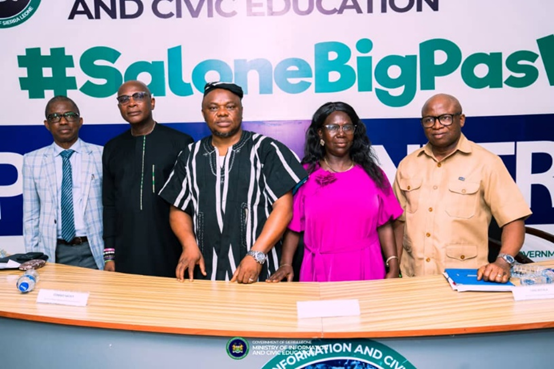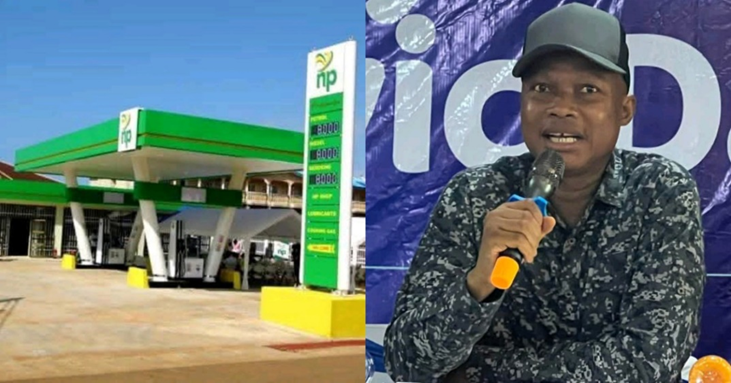By Mariama Bundu
In a bid to modernize public services and strengthen national development frameworks, several government agencies rolled out major initiatives and updates during a press briefing held on Tuesday, August 5, 2025. Spearheaded by the Ministry of Information and Civic Education, the briefing offered a comprehensive look at national planning, education, digital reform, and arms control—signaling a growing shift toward innovation and accountability across sectors.
Held under the theme of “Transforming Public Systems for Inclusive Growth,” the weekly press engagement brought together senior officials from the Ministry of Basic and Senior Secondary Education (MBSSE), the Teaching Service Commission (TSC), and the Sierra Leone Commission on Arms and Ammunition. Their updates collectively outlined government priorities ahead of the 2026 national census and broader national development goals.
Deputy Minister of Information and Civic Education, Bockarie Abdel-Aziz Bawoh, used the platform to introduce the government’s early awareness campaign for the 2026 National Population and Housing Census. In a notable departure from previous enumeration exercises, Bawoh emphasized that the next census will be entirely digital and community-driven. A two-day strategic planning workshop, conducted in collaboration with Statistics Sierra Leone on July 30–31, 2025, was reportedly aimed at designing inclusive messaging and identifying trusted communication channels to build public trust.
“The upcoming census is not just about numbers—it’s about knowing who we are, where we live, and what services we need,” said Bawoh. “This time, we want every Sierra Leonean to feel seen and counted.”
This digital transformation effort reflects broader government objectives to streamline public data collection and planning processes, while also improving accuracy and reducing manipulation risks. The Deputy Minister hinted that further public engagement campaigns and stakeholder consultations would soon follow.
Education took center stage as Minister of Basic and Senior Secondary Education, Conrad Sackey, unveiled the long-awaited results of the 2025 National Primary School Examination (NPSE). Over 171,000 pupils sat for the exam this year—an increase of more than 6,000 compared to 2024, with girls slightly outnumbering boys.
“This increase demonstrates growing public confidence in our education system,” said Sackey, while also highlighting significant performance gains. The top T-score for 2025 was 346, rising from 344 in 2024 and 339 in 2023, indicating a gradual yet consistent improvement in academic outcomes.
Among the 171,112 pupils who registered, 5,735 were absent—an increase from last year, raising concerns about possible barriers to participation. Of those who completed the exam, 128,766 met the national pass benchmark of 230. Impressively, 4,483 candidates scored above 300.
Minister Sackey took the opportunity to praise government and government-assisted schools, which outperformed many private institutions. He reminded parents to follow the official pricing structure for school supplies and discouraged exploitative practices during school reopening periods.
Alimatu A. Massaquoi, Public Relations Officer of the Council of Principals of Secondary Schools, reassured the public of the Council’s commitment to price transparency. She noted that secondary schools would publicly display the official list of approved fees and school supply prices as soon as it was received from the Ministry.
However, she urged the Ministry of Finance to ensure timely disbursement of school subsidies, warning that delays could jeopardize the implementation of the Free Quality Education (FQE) programme. “Without prompt funding, even our best efforts cannot deliver the results that our children deserve,” she said.
Another highlight of the briefing came from Lans Keifala, Chairman of the Teaching Service Commission (TSC), who announced the launch of the Teacher Management Information System (TMIS)—a new online platform designed to simplify teacher recruitment and reduce bureaucratic delays.
Keifala confirmed that 3,300 new teachers would be recruited this year, 2,000 of whom will be directly funded by the government. He noted this builds on a consistent annual recruitment pattern over the past three years.
“The TMIS is more than a recruitment tool. It’s a system to manage the teaching workforce fairly and efficiently,” he explained.
A new teacher quota policy, based on regional pupil-teacher ratios, is also being introduced to ensure equitable teacher distribution across the country. In a move that may incentivize academic advancement, Keifala revealed that teachers holding Master’s degrees would now receive salaries equivalent to Vice Principals.
He also announced that the TSC is working closely with the Sierra Leone Teachers’ Union (SLTU) to provide low-interest loans to teachers at a 10% annual rate. Discussions are ongoing with the Ministry of Finance to reinstate remote area allowances to attract educators to underserved rural regions.
Turning to national security, Major General (Rtd) Christian Fahim Marah, Commissioner and Registrar of the Sierra Leone Commission on Arms and Ammunition, provided an overview of reforms within his agency. He highlighted the Commission’s transition from the National Commission on Small Arms to a broader, internationally aligned agency compliant with the Arms Trade Treaty and the ECOWAS Convention.
In 2025 alone, the Commission destroyed 3,900 unserviceable weapons, pushing the total number of weapons destroyed in recent years to over 8,500. A new marking system for legal firearms has been completed in all regions except the Western Area and has helped authorities trace ownership more efficiently.
The Commission has also issued over 1,000 licenses to private individuals, part of a broader strategy to track legal weapon ownership and reduce illegal trafficking.
Tuesday’s press briefing presented a government increasingly focused on data-driven planning, transparency, and inclusive service delivery. With digital reforms spreading across education, census planning, and security systems, Sierra Leone appears poised to embrace a more modern governance model.
Whether these policy shifts translate into tangible improvements for everyday citizens will depend on consistent implementation, inter-agency coordination, and sustained public engagement—a challenge the government seems willing to confront head-on.



